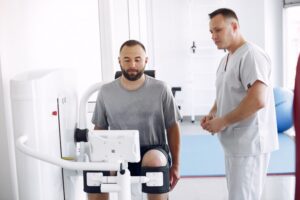Kinesiologist in Delta: Restoring Movement and Function
Kinesiologist in Delta
Kinesiologist in Delta, also known as active rehabilitation, is a multidisciplinary approach that focuses on the assessment, treatment, and management of movement-related conditions and injuries. It incorporates principles from various fields such as anatomy, physiology, biomechanics, and exercise science. In this description, we will explore the role of kinesiology and active rehabilitation, the conditions they can help with, the benefits they offer, and how they contribute to restoring movement and function.
The Role of Kinesiology and Active Rehabilitation:
Kinesiology and active rehabilitation professionals, known as kinesiologists, specialize in analyzing movement patterns and developing individualized exercise programs to improve strength, flexibility, endurance, coordination, and overall functional abilities. They work closely with individuals who have experienced musculoskeletal injuries, chronic pain, or movement limitations due to various conditions.
Assessment and Treatment:
Kinesiologists in the delta begin by conducting a thorough assessment to evaluate an individual’s movement patterns, strength, range of motion, posture, and functional limitations. They may use various assessment tools and techniques, such as gait analysis, muscle testing, and functional movement screens, to gather information about the individual’s specific needs and goals.

Based on the assessment findings, kinesiologists develop customized treatment plans that focus on improving movement quality, restoring functional abilities, and addressing any underlying musculoskeletal imbalances or weaknesses. These treatment plans typically include targeted exercises, manual therapies, and education on proper body mechanics and injury prevention techniques.
Conditions Treated with Kinesiology/Active Rehabilitation:
Kinesiology and active rehabilitation can be beneficial for a wide range of conditions, including:
- Musculoskeletal Injuries: Kinesiologists are skilled in managing injuries such as sprains, strains, fractures, and post-surgical rehabilitation. They help individuals recover from these injuries by designing exercise programs that promote tissue healing, improve range of motion, strengthen muscles, and restore functional abilities.
- Chronic Pain: Individuals suffering from chronic pain conditions such as low back pain, neck pain, or fibromyalgia can benefit from kinesiology and active rehabilitation. Kinesiologists focus on improving posture, strengthening supportive muscles, and promoting pain-free movement through targeted exercises and manual therapies.
- Rehabilitation after Surgery: Kinesiology plays a crucial role in post-surgical rehabilitation. Whether it’s a joint replacement, ligament reconstruction, or spinal surgery, kinesiologists work closely with individuals to restore strength, range of motion, and functional abilities through progressive exercise programs and manual techniques.
- Sports Injuries: Kinesiology is widely used in sports medicine to rehabilitate athletes and individuals involved in physical activities. Kinesiologists help individuals recover from sports injuries, such as sprains, strains, and ligament tears, by implementing sport-specific exercise programs, injury prevention strategies, and performance enhancement techniques.
- Neurological Conditions: Kinesiology can also benefit individuals with neurological conditions such as stroke, multiple sclerosis, or Parkinson’s disease. Kinesiologists enhance motor control, balance, and coordination by using specialized exercises and techniques tailored to meet each individual’s specific needs.
Benefits of Kinesiology/Active Rehabilitation:
Improved Movement and Function:
A kinesiologist in Delta aims to restore movement and improve overall functional abilities. Targeted exercises and therapies help individuals regain strength, flexibility, balance, and coordination, enhancing movement and improving their quality of life.
Pain Reduction:
Kinesiology interventions often include exercises and manual therapies that help reduce pain associated with musculoskeletal conditions and injuries. By addressing muscle imbalances, improving posture, and promoting proper movement mechanics, individuals experience pain relief and improved comfort.
Injury Prevention:
A kinesiologist in Delta not only helps individuals recover from injuries but also focuses on preventing future injuries. Kinesiologists identify movement deficiencies, improve strength, and teach proper body mechanics, empowering individuals to prevent injuries and boost performance.
Individualized Approach:
Kinesiologists in delta and active rehabilitation programs are highly individualized, taking into account each person’s specific needs, goals, and limitations. This personalized approach ensures that treatment plans are tailored to address individual weaknesses, promote progress, and achieve optimal outcomes.
Functional Training:
Kinesiologists in Delta emphasize functional training, which involves exercises that mimic activities of daily living or specific sport-related movements. By training the body in movements it encounters regularly, individuals improve their ability to perform daily tasks, engage in recreational activities, and return to sports or work activities.
Enhanced Quality of Life:
By restoring movement and function and reducing pain, kinesiology and active rehabilitation contribute to an improved quality of life. Individuals can regain independence, participate in activities they enjoy, and experience increased confidence in their physical abilities.
Holistic Approach:
A kinesiologist in delta takes a holistic approach to rehabilitation by considering the interplay between physical, mental, and emotional factors. Kinesiologists address physical aspects and educate
individuals on lifestyle changes, stress management, and overall well-being to support complete recovery. Kinesiologists in delta and active rehabilitation play a vital role in restoring movement, function, and overall well-being.
Individuals recovering from injury, managing chronic pain, or enhancing performance benefit from kinesiologists’ personalized, evidence-based techniques and targeted exercise programs. Kinesiology enhances movement, function, and quality of life by addressing individual needs, promoting proper mechanics, and encouraging active recovery involvement.